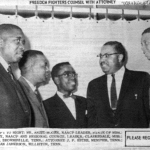Today in “Hidden” History is a daily listing of important but little-known events illustrating the range of innovators, contributors, or incidents excluded from formal history lessons or common knowledge. Hidden history is intended not as an exhaustive review, but merely as an illustration of how popular narratives “hide” many matters of fundamental importance. Bookmark this page and check daily to quickly expand your knowledge. Suggest entries for Today in “Hidden” History by clicking the Contact Us link.
April 25| Date | Type | Event |
|---|---|---|
| 1944 |  UNCF, the United Negro College Fund, also known as the United Fund, an American philanthropic organization that funds scholarships for Black students and general scholarship funds for 37 private historically Black colleges and universities is incorporated by Frederick D. Patterson (then president of what is now Tuskegee University), Mary McLeod Bethune, and others. Operating under the tagline, “A mind is a terrible thing to waste,”® in its 70 years of operations UNCF has raised more than $5 billion and helped more than 500,000 students and counting not just attend college, but thrive, graduate and become leaders. UNCF fulfills its mission in three ways: (1) by awarding more than 10,000 students scholarships, worth more than $100 million, each year; (2) by providing financial support to 37 historically Black colleges and universities (HBCUs); and (3) by serving as the nation’s leading advocate for the importance of minority education and community engagement. Since its founding in 1944, UNCF has helped to more than double the number of minorities attending college. The six-year graduation rate for UNCF African American scholarship recipient is 70%, 11% higher than the national average and 31% higher than the national average for all African Americans. Learn more. UNCF, the United Negro College Fund, also known as the United Fund, an American philanthropic organization that funds scholarships for Black students and general scholarship funds for 37 private historically Black colleges and universities is incorporated by Frederick D. Patterson (then president of what is now Tuskegee University), Mary McLeod Bethune, and others. Operating under the tagline, “A mind is a terrible thing to waste,”® in its 70 years of operations UNCF has raised more than $5 billion and helped more than 500,000 students and counting not just attend college, but thrive, graduate and become leaders. UNCF fulfills its mission in three ways: (1) by awarding more than 10,000 students scholarships, worth more than $100 million, each year; (2) by providing financial support to 37 historically Black colleges and universities (HBCUs); and (3) by serving as the nation’s leading advocate for the importance of minority education and community engagement. Since its founding in 1944, UNCF has helped to more than double the number of minorities attending college. The six-year graduation rate for UNCF African American scholarship recipient is 70%, 11% higher than the national average and 31% higher than the national average for all African Americans. Learn more. | |
| 1959 |  Mack Charles Parker is murdered by a a vigilante mob of eight to ten hooded and masked men, wearing gloves, in Mississippi. He had been accused of raping a pregnant white woman at gunpoint in northern Pearl River County, Mississippi. Mr. Parker vehemently denied having raped anyone, and statements from his supporters after his death suggested that the rape accusations may have been fabricated by the alleged victim as a means of concealing an ongoing consensual affair with a local white man. Additionally, while awaiting trial, Mr. Parker was subjected to several lie detector tests, all of which either indicated he was telling the truth or were inconclusive. In addition, no handgun was ever found by police, nor was one ever connected to Mr. Parker. Three days before he was to stand trial, Mr. Parker was kidnapped from his jail cell in the Pearl River County Courthouse by a mob, beaten and shot. His body was found in the Pearl River, 20 miles west of Poplarville, 10 days later. Following an investigation by the Federal Bureau of Investigation, the men who killed him were released. Despite confessions, no one was ever indicted for the killing. Historian Howard Smead called the killing the "last classic lynching in America." Learn more. Mack Charles Parker is murdered by a a vigilante mob of eight to ten hooded and masked men, wearing gloves, in Mississippi. He had been accused of raping a pregnant white woman at gunpoint in northern Pearl River County, Mississippi. Mr. Parker vehemently denied having raped anyone, and statements from his supporters after his death suggested that the rape accusations may have been fabricated by the alleged victim as a means of concealing an ongoing consensual affair with a local white man. Additionally, while awaiting trial, Mr. Parker was subjected to several lie detector tests, all of which either indicated he was telling the truth or were inconclusive. In addition, no handgun was ever found by police, nor was one ever connected to Mr. Parker. Three days before he was to stand trial, Mr. Parker was kidnapped from his jail cell in the Pearl River County Courthouse by a mob, beaten and shot. His body was found in the Pearl River, 20 miles west of Poplarville, 10 days later. Following an investigation by the Federal Bureau of Investigation, the men who killed him were released. Despite confessions, no one was ever indicted for the killing. Historian Howard Smead called the killing the "last classic lynching in America." Learn more. | |
| 1960 |  In the midst of a years long voting and civil rights struggle in Fayette County, Tennessee, the federal government is finally able to end the boycott by election officials in Fayette County, and voter registration begins again through a consent decree in United States v. Fayette County Executive Committee. Registration only opens on Wednesdays, and Black citizens are forced to stand in line for hours in high temperatures to vote, some even fainting. On the other hand, white citizens who wish to register to vote are able to show up, register, and leave within a matter of minutes. Whites and courthouse employees harass Blacks by throwing hot coffee and pepper, or spitting on them. At this point, only 1,000 of the 9,000 voting age adults have registered to vote. The organized voting and civil rights actions in Fayette County were initiated by Memphis NAACP-affiliated Attorney James F. Estesin 1958, who organized local leaders to register Blacks to vote in Fayette County. Following the initiation of these efforts, whites in Fayette County undertake a decade-plus long retaliation effort, including pressuring local businesses to refuse to sell products or services to register Blacks, evicting registered Black sharecroppers and renters from their homes and livelihoods, shutting down voter registration altogether, and other actions to starve out and punish any African American who registered to vote. Learn more. In the midst of a years long voting and civil rights struggle in Fayette County, Tennessee, the federal government is finally able to end the boycott by election officials in Fayette County, and voter registration begins again through a consent decree in United States v. Fayette County Executive Committee. Registration only opens on Wednesdays, and Black citizens are forced to stand in line for hours in high temperatures to vote, some even fainting. On the other hand, white citizens who wish to register to vote are able to show up, register, and leave within a matter of minutes. Whites and courthouse employees harass Blacks by throwing hot coffee and pepper, or spitting on them. At this point, only 1,000 of the 9,000 voting age adults have registered to vote. The organized voting and civil rights actions in Fayette County were initiated by Memphis NAACP-affiliated Attorney James F. Estesin 1958, who organized local leaders to register Blacks to vote in Fayette County. Following the initiation of these efforts, whites in Fayette County undertake a decade-plus long retaliation effort, including pressuring local businesses to refuse to sell products or services to register Blacks, evicting registered Black sharecroppers and renters from their homes and livelihoods, shutting down voter registration altogether, and other actions to starve out and punish any African American who registered to vote. Learn more. |

